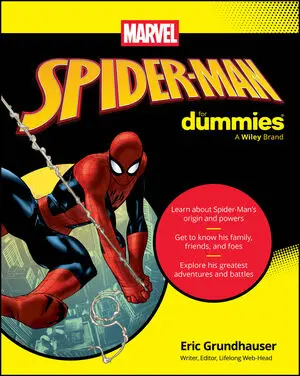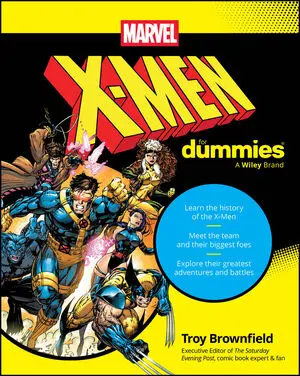As one of Marvel’s first heroes, Spider-Man has been slinging webbed justice since the 1960s, and he’s woven a complex web of triumphs, tragedies, loves, and laughs in the process. Whether you’re just diving into Spidey’s world or looking to reload your web-shooters, this handy cheat sheet helps get you started.
Spider-Man mini-glossary
Over the years, the Spider-Man mythos has produced a vocabulary all its own. Here are some terms and phrases that can make Spider-Man a bit easier to understand.
Nicknames (Spidey, Web-Head, web-slinger)
Spider-Man has many nicknames, including Spidey, Web-Head, web-slinger, wall-crawler, and Webs. (Or, if you’re J. Jonah Jameson, menace!) Peter Parker has his own nicknames as well, including Tiger, Puny Parker, and Midtown High’s Only Professional Wallflower.
Quip
Quip is a slightly archaic term for a clever remark or a spur-of-the-moment taunt, but in the modern day it’s often associated with Spider-Man’s quick wit. Every mean nickname or self-deprecating gag that Spider-Man spits out while he’s battling his villains is another quip.
Spider-Sense
One of the powers that makes Spider-Man such a fearsome fighter is his Spider-Sense, a kind of psychic frequency that alerts him to danger. He receives a helpful tingle (sometimes a more shocking sensation) that lets him react quickly if a fist is flying toward his face or a nearby innocent is in harm’s way.
Spider-Verse
Spider-Verse is a catch-all term for the infinite collection of alternate universes containing a version of Spider-Man. This multiverse is connected by the mystical Web of Life and Destiny, which variant spider-heroes use to travel the dimensions.
THWIP
When Spider-Man shoots his webs on a comic book page, they make a very specific sound: THWIP! You can imagine what this would sound like in real life, but simply saying the sound effect out loud would probably be just as accurate.
Wall-crawling
Spider-Man’s ability to stick to any surface is generally referred to as wall-crawling. When he’s hiding on the ceiling, climbing across the windows of a skyscraper, or sticking to a bridge, Spider-Man is wall-crawling. Despite its name, this ability has even helped keep Spider-Man’s mask on.
Webbing/web-fluid
Peter Parker devised an incredible chemical compound that he uses to create Spider-Man’s webbing. This web-fluid is incredibly strong; when dispensed from his wrist-mounted web-shooters, it can form thin strands, wide nets, or just about any other form Spider-Man needs.
Spider-Man issues to get you hooked
If you’ve never explored Spidey’s books before, finding a way in can be overwhelming; the canon covers a lot of comics. Here are some of ol’ Web-Head’s best single-issue stories to get you started.
Amazing Fantasy #15
Why not start at the beginning? If you want to see where Spider-Man came from, the best place to start is the short story in 1962’s Amazing Fantasy #15 that kicked it all off.
Amazing Spider-Man #50
Arguably the first truly great Spider-Man story, 1967’s Amazing Spider-Man #50 is an iconic exploration of the relationship between Peter Parker and his heroic alter ego. It’s the first time Peter tries to quit being Spider-Man, and it still provides the best argument for why that’s impossible. Check this one out to understand what makes Spider-Man tick.
Spectacular Spider-Man #310
Spectacular Spider-Man #310 from 2018 may be the final issue of writer Chip Zdarsky’s terrific run on the series, but it also makes a great place for new readers to start. You get to read about a handful of Spider-Man’s escapades from the everyday New Yorkers who’ve been touched by his heroics. It’s emotional and surprising and provides a snapshot of the many sides of Spider-Man.
Amazing Spider-Man #900
The 900th(!) issue of Amazing Spider-Man from 2022 has it all: Peter’s friends and family celebrating his birthday! The Sinister Six in peril! Robotic arms falling in love with Spider-Man! In one issue, you can find all the comedy, heart, and action that have always made Spider-Man such a classic character.
Spider-Man creators with great runs to follow
Across decades of Spider-Man comic books, countless writers, artists, editors, letterers, colorists, and other creators have brought Spidey’s adventures to life. Thanks to the many voices that have contributed to Spider-Man’s history, every creator’s run ends up with its own distinct flavor. Here are a few Spider-Man runs to try.
Stan Lee and Steve Ditko
These two started it all. With Amazing Spider-Man #1–38, the team of Lee and Ditko created the building blocks of Spider-Man’s world that writers are still using to create new stories today. Check out their run to explore Spidey’s foundational stories.
Todd McFarlane
Artist Todd McFarlane began working on Spider-Man stories in the late 1980s and quickly became one of the hottest artists in the industry. His exaggerated figures and unforgettable posing turned Spidey from just a web-swinging acrobat to a true contortionist and redefined the feel of Spider-Man for the 1990s.
Dan Slott
Easily the most prolific Spider-Man writer of all time, Dan Slott has taken Spider-Man from the depths of despair to the heights of success without ever losing sight of what makes him tick. Slott has written so much Spider-Man since 2008 that you can jump into his run from multiple places. Just pick one and dive in!
Brian Michael Bendis and Mark Bagley
Ultimate Spider-Man #1 by writer Brian Michael Bendis and longtime Spidey artist Mark Bagley kicked off a whole new era of wall-crawling in 2000. Set in an alternate universe, Bendis and Bagley’s Ultimate Spider-Man created an unforgettable, remixed history for a new, young Peter Parker that was free from the baggage of the ongoing Spider-Man of the main universe.
Zeb Wells
Zeb Wells is one of the more recent Spider-Man writers. He took over Amazing Spider-Man around 2022, and his run on the title is equal parts action-packed and hilarious. Wells’s tenure reimagines Spider-Man’s relationship with some of his greatest foes and makes the character as quick, quippy, and fresh as he’s ever been.
Where to find Spider-Man
Wondering where you can actually find Spider-Man stories? Don’t worry; you have options:
- Digital comics: Reading Spider-Man comics is easier than ever. The Marvel Unlimited app gives you access to nearly every Spider-Man comic ever published (as well as most of Marvel’s sprawling catalogue of books).
- Comic book stores: Support your local comic store! Pick up physical copies of Spider-Man’s adventures, whether they’re older graphic novels or brand-new monthly issues. It’s a great way to meet other readers and learn more about the exciting world of comics.






